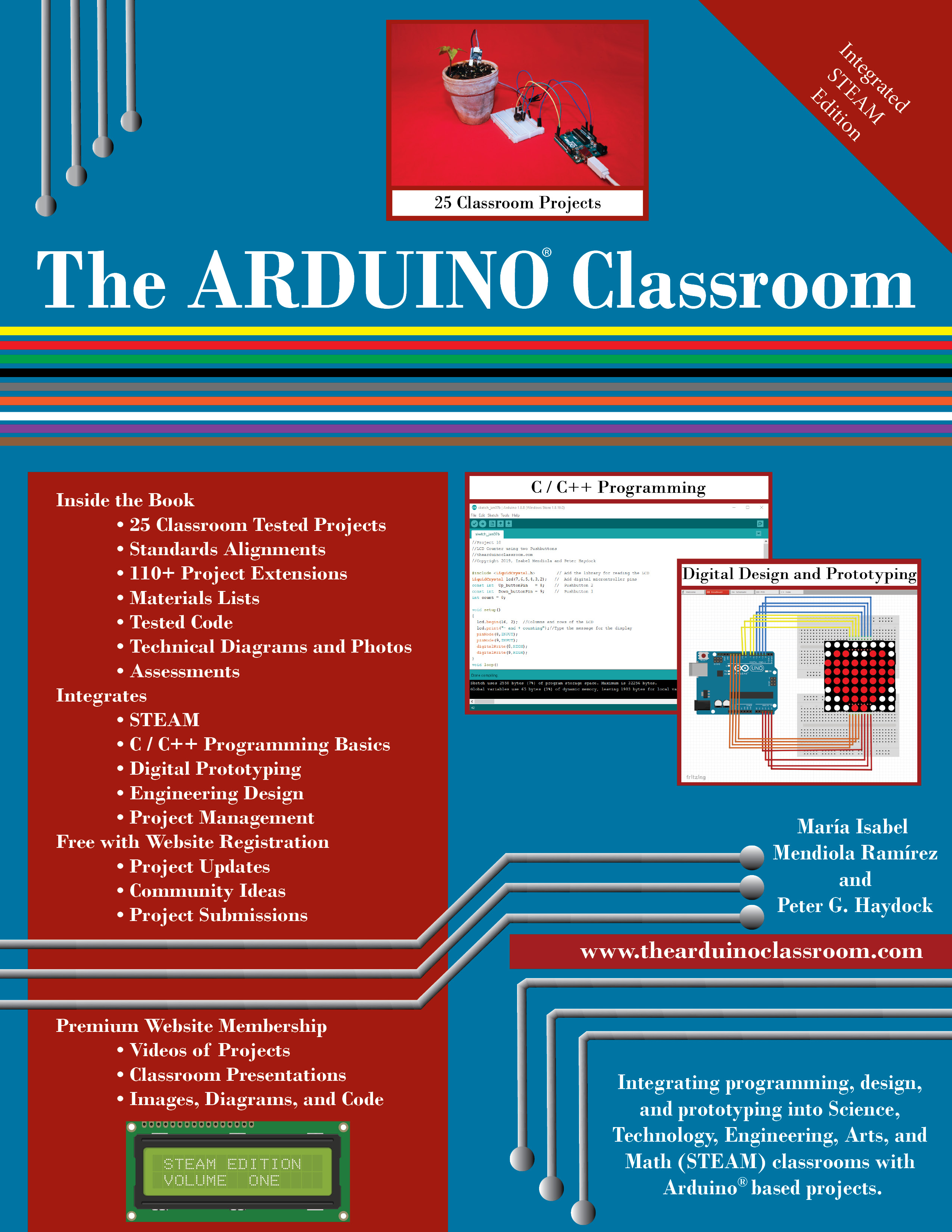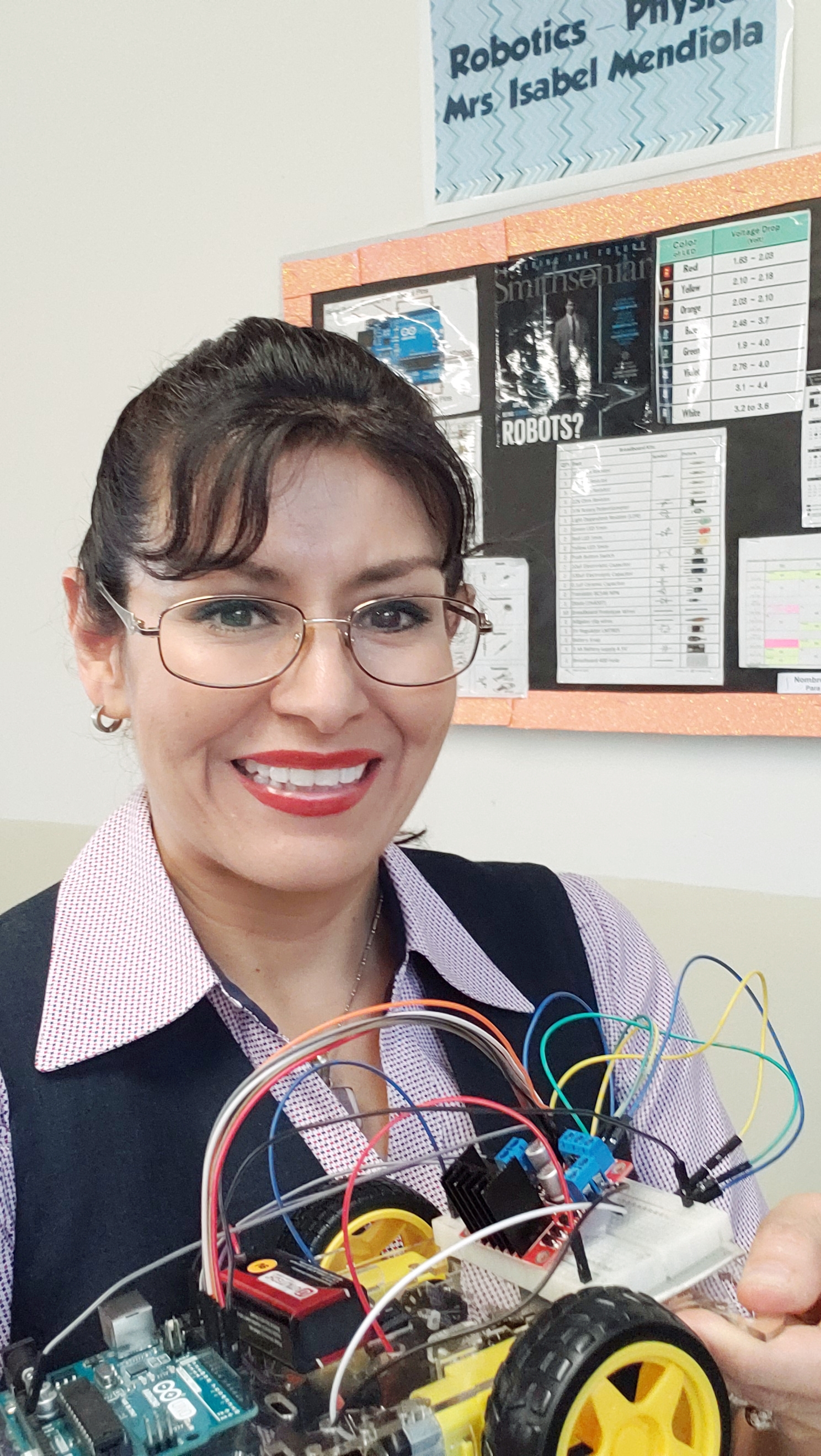The Arduino Classroom
Schedule


Isabel Mendiola
Isabel Mendiola For the past 15 years, Ms. Mendiola has been working as an educator in elementary, middle, and high schools in Monterrey Mexico. Ms. Mendiola has taught Biology, Physics, and Chemistry and is a pioneer of STEM/STEAM programming in Monterrey. She teaches in both in English and Spanish for learners of diverse skill levels. Because Monterrey is one of the largest centers of manufacturing in Mexico, there is a large demand for skilled workers including technicians and engineers. There are also many universities and hospitals that create a demand for laboratory specialists, nurses, scientists, and doctors. As a child, she has held a deep curiosity for robots, how vehicles move, and how electronic devices were made. She acted upon this curiosity by drawing sketches of bikes, furniture, and structures. Her parents encouraged this curiosity by bringing home vacuums and radios for her to dismantle. Her early passion was showing how things were designed and then building them. As an adult, she found that she had a gift for sharing her interests in technology and robotics with elementary and middle school students. She has worked for several schools in Monterrey. Eventually started working for a school that wanted to include small engineering projects in the elementary curriculum. She also integrated computer skills into the course work and saw the students responding positively. She also found that her teaching had to evolve. She began by designing teaching strategies that complimented students learning styles. She designed interactive presentations for each subject, building lesson plans around specific experiments and projects that included engineering. As a culminating experience, she introduced her students to science fairs and competitions in Monterrey where that met other motivated learners like themselves. But more importantly, the students met scientists and engineers who critiqued, validated, and extended their projects. For her current teaching position, she planned, implemented, and executed the preparation of students to compete in regional and national science contests such as JASON Project, Youth Leader Explorers and Comisión Nacional de Ciencias y Tecnología (CONACYT). Three years ago, she understood the importance of the Arduino(R) platform and began incorporating it into her teaching. For the past two years, she has written, implemented, and assessed the junior high school technology curriculum focused on Arduino(R). For her school, she has had the opportunity to write and implement after-school programs and training for teachers as well as the junior high school science and technology fair. Ms. Mediola has B.A's. in nutrition and child psychology, a federal certificate in educational pedagogy, completed coursework towards an engineering degree, and is currently completing her Masters in STEM Education. Awards and Accomplishments: Won first place in the 2012 Build-a-bot contest at Tec de Monterrey. Won two first places at the 2016 JASON Project science competition at Prepa Tec High School for a Tesla Coil project and a simulation of photosynthesis. Won two second places at the 2017 Youth Leader Explorer science competition at Prepa Tec High School with a pollution control device and booth display. Won second place at the 2018 Youth Leader Explorer science competition at Prepa Tec High School for a kinetic energy project Won Comisión Nacional de Ciencias y Tecnología (CONACYT) 2018 national science competition for an Arduino based greenhouse model Assembling a team for Instituto Motolinia to compete in 2019 at First Robotics Competition in Monterrey. Coordinating the Motolinia Institute STEM Fair 2013 - 2019
Susan Haydock
Peter Haydock
For over 25 years, Mr. Haydock has dedicated his professional life to education. His work has been at the nexus of, science, technology, and education. Mr. Haydock has worked as a classroom educator, administrator, a museum educator, and as a curriculum developer always building high-quality curriculum and experiences for all grade levels. Mr. Haydock has developed, led, and supported programs and platforms for respected educational programs and publishers, including CenterPoint Education Solutions, Parcc Inc., The Smithsonian Institution's Science Education Center, National Geographic Society's JASON Project, and the Milwaukee Public Museum. Working at CenterPoint Education Solutions, Mr. Haydock built online professional development courses and a pilot science assessment based on the Next Generation Science Standards (NGSS). For Parcc Inc., he built the Partnership Resource Center an online platform for educators looking to build skills with assessments. For Smithsonian, he held several positions. First for the Assistant Secretary for Education and Access he led the building an online open source engagement platform. He was also tasked with helping build cooperation between Smithsonian museums in education. He went on to be the Deputy Director for the Smithsonian Science Education Center (SSEC) and finished his tenure at Smithsonian as the Acting Director of the SSEC. For SSEC he led the efforts to build new technology-based resources for educators and began the rebuilding of the SSEC curriculum to align with NGSS. While at JASON Project he produced award-winning, standards-based, and inquiry-driven web, print, online games, field, and video resources. His work there included a complete program redesigns and rebuilding programs to garner industry awards, including seven CODiEs. He was able to partner with scientists and engineers from NOAA, NASA, Department of Energy, the Insurance Institute for Highway Safety, The Carnegie Institute, and National Geographic. For Milwaukee Public Museum, Mr. Haydock was hired to lead educational services and was promoted to oversee all education and public programs including tours, camps, and professional development. While there he revamped school services to be standards-based and launched the Passport to Distance Learning. He co-authored several articles on distance learning. At the start of his career, Peter taught science for two schools in Wisconsin and was a technology specialist where he wrote and implemented a long-range technology plan and K–12 scope and sequence for educational technology. He has also served as an adjunct lecturer and Action Research Adviser at Cardinal Stritch University. Mr. Haydock holds a BS in Biology, a Secondary Education certificate in Life Sciences, a Master of Library and Information Science, and a Post-baccalaureate award in Economics, all from the University of Wisconsin-Milwaukee. Mr. Haydock has volunteered as a project reviewer for the Wisconsin Engineering and Design Competition for the past four years and volunteered as a science fair coach for a school in Mexico. He has been working with Arduino® for the past three years and sees it as an opportunity to integrate technology and engineering in the STEAM classroom.
More Event Info
More Project Info
https://www.thearduinoclassroom.com/
What inspired you to make this project?
The need to bring Arduino based projects to STEAM classrooms.
